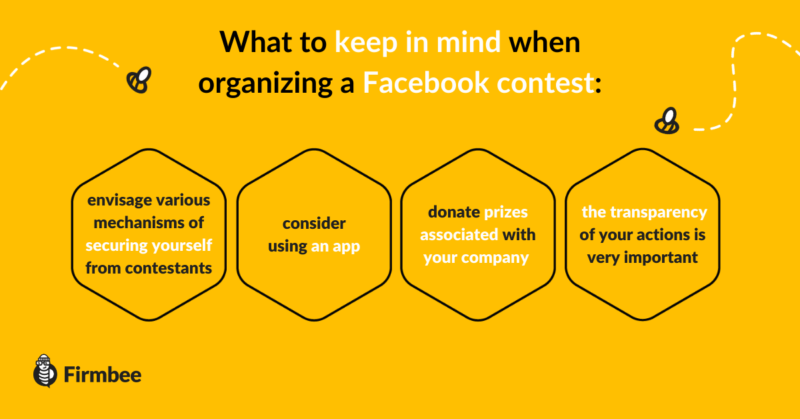A popular form of expanding reach on Facebook is organizing contests. Do you know how to use this tool effectively? Do you know Facebook’s regulations and relevant legal provisions relating to contests? Do you know how to measure the effects of your actions? If you couldn’t answer at least one question, take a look at our tips and explanations in the following paragraphs. We guarantee – you won’t regret that!
Facebook contests – table of contents:
- Why a contest?
- Facebook competitions in compliance with the law
- What to remember when organizing a competition on Facebook?
Why the contest?
The first question you should ask yourself is about the legitimacy of organizing a contest. The vast majority of contests are created without any preconception and end up with the feeling that both the time and resources have been pointlessly wasted by the brand carrying out the endeavor. Surely, it doesn’t have to be like that. Let’s dissect the whys.
What goals can a contest achieve? Contrary to popular opinion, we don’t recommend organizing contests to generate more followers and extend your reach. It is very difficult to design a good mechanism that will limit the inflow of prize hunters and uninterested people and will only sift potential customers. After all, we don’t care about the reach as such, but the reach in our target group.
It is a good idea to prepare a contest in such a way as to increase sales. By this I mean an increase in total sales, individual products, as well as the shopping basket. A strong trend of lowering the entry threshold, i.e. making it easy for everyone to take part, is not such a good direction at all. Sometimes it is worth demanding (e.g. when buying a product or service) a higher entry threshold to gain measurable benefits.
The third purpose of contests is to gain valuable data concerning your customers. What they like, what they like, what should be improved, how they use the product, etc. As you can guess, the goals can be combined.
Regardless of what you care about, define the concrete outcomes you expect so that you can hold yourself accountable. We caution against focusing on inappropriate metrics, such as the number of submissions, which has no direct impact on the company’s financial performance. Instead, I recommend measurable and tangible figures such as increased sales, response, or customer base growth.
Facebook competitions in line with the law
Facebook’s terms of service have one brief point in this regard: the contest must have terms of service stating who is organizing the contest and must not use the users’ timelines. In other words, we can’t require people to post on their private profiles, share, tag themselves in photos, or anything else that might appear on a contestant’s profile, excluding messages from the app.
We can require liking the fanpage, but not sharing the contest post. Facebook can delete a contest post or even suspend or shut down an entire fanpage for such actions, and it’s not as uncommon as you might think.
Without going into legal intricacies, the contest should have regulations (with dates, responsible entity, etc.) – here we recommend legal backup in a form of a lawyer. Besides, competitions with drawing of winners require notification to the Customs Chamber. Lack of notification means can lead to legal punishment in a form of a fine, but this is subjected to the country’s regulations. So make sure to double-check the matter way before setting up your contest.
We encourage writing regulations, because this is the only way to include a clause that the submitted works can be used by us as brand communication. The secondary goal of the contest should be to generate user content, which we can then publish at will.
What is to keep in mind when organizing a contest on Facebook?
Apart from planning the goal and measuring the effects, envisage various mechanisms of securing oneself from contestants. There are professional contestants who often earn their living this way. They are not interested in your company, they make it impossible for your actual clients to win and they are demanding and annoying.
An example of a senseless mechanism exposing us to the harm of the contestants is a competition in which the application with the most likes wins. Currently, obtaining likes on Facebook is as cheap as bread. For a regular person, getting 100 likes for a post or a photo may appear as an achievement but for the regular contestant, it is several minutes and few dollars.
Not to mention the competition groups, where such “professional” players support each other. None of these likes are meaningful for our business – they are from artificial accounts or people who professionally participate in contests, and cause frustration to our customers.
Consider using an app. Despite additional costs, increasing the entry threshold and the complexity of the contest, we can ask the participants to agree to receive marketing materials. In this way, we can obtain a database of e-mails for the newsletter or an interesting group for which we can target ads on Facebook.
I also always encourage to donate prizes associated with our company. Random people are always more likely to opt for a camera or a tablet. Only our clients will go for a product complementary to the one they have to buy in the contest.
If you want to combine social elements, i.e. the opinion of Internet users, but protect yourself from their pranks, maybe you should combine these elements to form something fresh. Remember that on the web many people like to tease others and vote for a joke.
The solution is, for example, to create a two-stage system of voting by Internet users and selection of a committee, although in the light of the possibility of buying votes I recommend a slightly different solution. To take part, an entry must receive a certain minimum number of votes, e.g. 10 likes, and from those that meet this condition, the committee selects the best one.
In a competition, the transparency of our actions is extremely important. It is very easy to damage your image with accusations of nepotism, dishonesty or unprofessionalism. And this is not the effect we want to achieve.

To sum up, contests can be a great business tool for promoting a brand and gaining new customers. Yet, take some to determine its course, regulations and scope to avoid unpleasant mishaps or as they say, monkey business.
After collecting the data, learn how to use it and increase the effectiveness of actions with Facebook Audience Insights and also how to make a good Facebook advertisement.
If you would like to stay in touch with our content, join the busy bees’ community!
Author: Laura Green
There’s probably no social media channel or tactic that Laura doesn’t feel confident about. Whether it’s jumping on the latest TikTok trend, launching a Pinterest campaign, or live-streaming on YouTube - this Social Media Ninja has done it all.


















